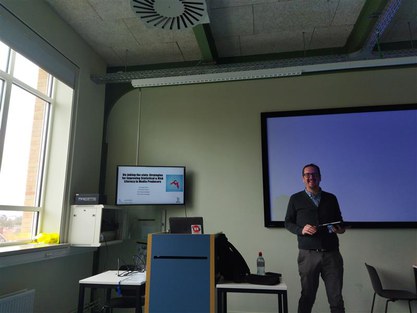Research seminar by dr. Fergal Quinn
(21-03-2024)

On the 21st of March, he gave a research seminar at the department on his latest ongoing project in health and risk communication. This interdisciplinary project investigates the problems journalism students face when interpreting statistics and risk, as well as strategies for improving statistical and risk literacy in media producers.
‘Popular drink slashes cancer risk in women by huge 29%’, ‘CDC report finds underlying conditions in 94 percent of COVID-19 deaths’ ... : numbers are often trown into the fray to persuade rather than to inform. This is what it means to juke the stats: to deliberately misrepresent, while technically not lying . This problem was brought to light by the Covid-19 crisis, but also occurs in news reports on climate change, health discussions on alcohol consumption, and other issues. In order to un-juke the stats, education for medical and journalism students should stress the importance of using both descriptive words and accurate numbers together.
The research shows that journalism students often struggle with a lack of confidence in their numerical and statistical skills, despite their actual proficiency.
For further reading on this topic:
- Words and numbers: a comparative study of medical and journalism students’ descriptors of risk, numeracy and preferences for health risk communication (Fallon et al., 2024)
- Why retractions of numerical misinformation fail: The anchoring effect of inaccurate numbers in the news (Stubenvol & Matthes, 2011)
- Fear-Mongering or Fact-Driven? Illuminating the Interplay of Objective Risk and Emotion-Evoking Form in the Response to Epidemic News (Klemm et al., 2017)